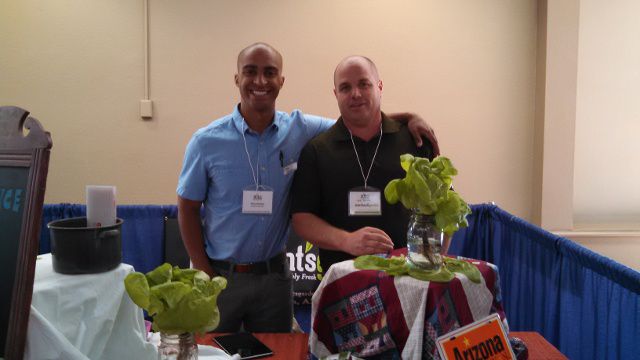Meet Arizona Agriculture’s Chaz Shelton and Merchant's Garden
Published
6/14/2016
By Julie Murphree, Arizona Farm Bureau Communication Director: Yes, Tucson has a farm in the city thanks to Chaz Shelton, a newly minted member of Arizona Farm Bureau.
While getting his master’s degree in public administration at the University of Pennsylvania in 2011, Shelton was working with the Philadelphia Department of Public Health. During that time he discovered a lack of available fresh produce in the city. This experience gave him a real drive to try and get more fresh fruits and vegetables to urban centers. He also felt his current educational route would not lead him in the right direction
So, Shelton turned his attention to private industry and enrolled in Indiana University’s MBA program to help him devise a business plan. Could he come up with a business solution that created a farm in the city?
Shelton’s parents, who live in Tucson, told him about the University of Arizona’s aquaponics program. He discovered the wonders of this unique-type of agriculture. He started with lettuce, grown in recirculated nutrient-rich waste water pumped from nearby fish tanks. Merchant’s Garden was born.
In its first year, Merchant’s Garden sold to several restaurants, a retail grocery store, a farmer’s market, and to a chef.
An ongoing series about Arizona agriculture’s farmers and ranchers.
Interview with Chaz Shelton of Tucson, Arizona.
Tell us about your agribusiness operation(s): The Merchant’s Garden provides out-of-season produce to restaurants, grocery stores, and for home consumption. This is made possible by leveraging the science of aquaponics and hydroponics in a computer-controlled greenhouse environment. It is a combination of B2B and B2C sales. It houses the entire supply chain: we build, grow, harvest, and deliver locally produced food. This is a local production for local consumption model based in Southwest Arizona.

Chaz Shelton (left) is co-owner of Merchants Garden Agrotech, Inc., a farm in the city. Bill Shriver (right) is COO of the company.
Any farming/business practices that highlight water conservation, soil health or and other special practice you instituted to save money and improve the farm or business?Merchant’s Garden makes use of areas that were previously thought to be “unfarmable.” For example,
The intent is to provide fresh produce to consumers in the most densely populated part of the city. In additional of property that product, we’d like to provide complete transparency of how
Our production is entirely aquaponics and hydroponics which can use a fraction of the water that traditional farming consumes. It is estimated that it can save up to 90% of the water than traditional farming. As the abundance of water continues to deplete, alternative food productions will be a necessity. The AquaBox is able to produce 10X greater volume per square acre than that of traditional farming.
What are your business goals over the next 5 years? 10 years? We’d like to create a scalable way to provide local food everywhere. With the growing demand
What is your educational background (i.e. Degree(s), certifications, honors)? Our main grower is Brunno Cerozi who just graduated with a Ph.D. in the Department of Soil, Water and Environmental Science from the University of Arizona and will be the V.P. of Agriculture.
I received a B.A. from Hope College in Economics and Management. I also received a graduate certificate in Economic Growth & Development for the University of Pennsylvania. I finished my MBA last year from Indiana University, majoring in entrepreneurship and finance. I recently received my Green Belt in Six Sigma.
Will anyone in your family – younger generation – pursue the agribusiness? My step father is my co-founder and it’s our first time in the agriculture space. We are hoping to create a business that’ll spend many generations beyond us.
What are your community activities? We work very closely with the Community Food Bank of Southern Arizona. They have done
Why are you a Farm Bureau member? As new business individuals to this industry, Farm Bureau’s rich history has been a great place for us to familiarize ourselves with the industry.
How will the next generation of agriculturalists have to operate? We hope that what we are doing and creating now is the next generation of agriculture. We are committed to creating the technology today that will feed the people of tomorrow.
What is the best business advice that you’ve received and/or have given? “Ideas are a dime a dozen, but making things happen is what really matters.” We are fortunate to have the support of some investors from Indiana. These